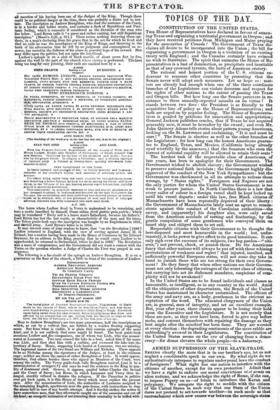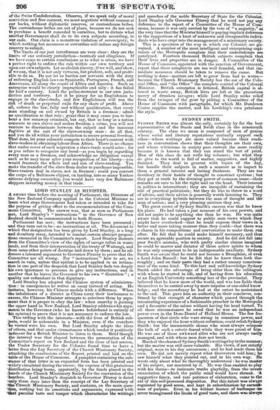ARMED SUPPRESSION OF THE SLAVE-TRADE. SEEING clearly the mote that
is in our brother's eye, let us not neglect a considerable speck in our own. By what right do we authoritatively interpose to regulate under penal laws the conduct of foreigners? What right has one nation to interfere with the citizens of another, except for its own protection ? Admit that we have a right to enforce our moral convictions vi et armi4 on alien nations, and we acknowledge the right of Rome, if she can, to impose Popery on us—of Islam to introduce the Koran and polygamy. We arrogate the right to meddle with the citizen of the United States m such way that one State of the Union dares not pretend to act towards another—in such mode as that encroachment which now causes war between the sovereign states of the Swiss Confederation. Observe, if we speak only of moral conviction and free consent, we must negotiate without cannon at our backs, without diplomatic reserves, or customhouse bribes. The customhouse bribes are out of place, because we do not seek to purchase a benefit conceded to ourselves, butte dictate what another Government shall do to its own subjects according, to our code. Our claim is a monstrous violation of sovereignty, to which nothing but meanness or cowardice will induce any foreign country to submit. The limits of our just interference are very clear: they are the limits of our ordinary jurisdiction—territory and allegiance. If we have come to certain conclusions as to what is crime, we have a perfect right to enforce the rule within our own territory and upon our own subjects. Let us abolish slavery, if we will, and show, if we can, that it is not only virtuous, but prudent, safe, and profit- able to do so. Do not let us burden our servants with the duty of enforcing English laws on Spaniards, Portuguese, French, and Americans, all along the coasts of Africa and America. Such an enterprise would be clearly impracticable and silly : it has failed for half a century. Limit the police-restraint to our own juris- diction and territory. Let it he piracy for an Englishman to engage in the slave-trade, and few Englishmen will run the risk of death or perpetual exile for any share of profit. Above all, enforce the law, fully and without qualification, that every man standing on soil owned by Britain is a freeman : admit no qualification to that rule ; grant that it may cause you to har- bour a few runaway criminals, but say, that so long as a nation consents to own slaves and makes freedom a crime, you will not .venture to discriminate between the culprit and the innocent fugitive at the suit of the slave-owning state : do all that, and you do all within your jurisdiction to secure personal freedom. That done, let your colonists compete to their heart's content with slave-traders in obtaining labour from Africa. There is no chance that under cover of such migration a slave-trade would arise : for as you refuse to recognize any bond—as you begin by regarding every man as a freeman, and acknowledge no obligation except such as he may incur after your recognition of his liberty—you would frustrate the whole end and aim of slave-trading. You -make the transfer of the slave from dealer to purchaser impossible. Slave-traders deal in slaves, not in freemen : could you convert the cargo of a Baltimore clipper, on landing, into so many Yankee citizens defying ownership, you would have very few Baltimore shippers investing money in that trade.



























 Previous page
Previous page